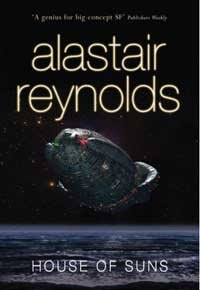You are currently browsing the daily archive for December 29, 2016.
House of Suns by Alastair Reynolds (2008) 473 p.

I was lukewarm about Alastair Reynolds’ debut novel Revelation Space but recently found myself going down a Wikipedia wormhole of his fictional universe while I was bored at work, remembered that in terms of sheer creativity and ideas I actually quite liked him, and figured he was worth another crack. The Revelation Space sequels are exactly the kind of books I was happier to read the Wikipedia synopses of rather than slog through hundreds of pages of more padding and thinly drawn characters, so I thought I’d jump ten years further into his career and read House of Suns.
I’m glad I did, because it’s really quite good. Revelation Space took place in a universe a few thousand years into human colonisation of the galaxy: a cold, bleak and frightening place full of extinct alien civilisations, decaying cities and autocratic governments, where humanity is clinging to life rather than prospering. House of Suns takes a rather different tack: humans are still the only intelligent life to arise in the galaxy, but after six million years we’ve splintered, evolved and gene-tweaked our way into a million daughter species who have flourished in every corner of the galaxy – a steady tide of thousands of different stellar empires rising and falling. The novel is built around the concept of “shatterlings,” the thousands clones of wealthy industrialists who – back in the solar system, six million years ago – sent them forth to explore the galaxy. Thanks to the time-dilating effects of near-light travel, cryogenic freezing and generally advanced medicine, these clones operate on an entirely different timescale than other human civilisations; at one point a different kind of near-immortal describes the protagonist as “a bookworm who has tunnelled through the pages of history.” The shatterlings have powerful starships, conduct engineering feats on grand scales, trade with other civilisations for their immense amount of accumulated knowledge, and are generally perceived by lesser human civilisations as something like angels or gods.
Plotwise, House of Suns revolves around the shatterlings Campion and Purslane of the Gentian Line, i.e they are both clones of a woman named Gentian. They’re engaged in a taboo love affair and are on their way to one of the regular reunions held by the Gentian Line every few hundred thousand years. Upon their late arrival at the designated system they discover their Line has been ambushed and nearly wiped out. Most of the book is a mystery, as Campion, Purslane and the other surviving Gentians try to figure out who tried to annihilate their Line, and why.
House of Suns grabbed me right from the beginning. Over ten years of his writing career Reynolds has really improved: there’s far less bloat, the plot moves along at a cracking pace, and information is never brazenly withheld from the reader (a repeated sin in Revelation Space). The characters are still a bit flat, but I found it nice to read about people who are friendly and helpful to each other, rather than the cast of Revelation Space, who were bafflingly hostile and suspicious of each other even when they were natural allies. The plot gets a bit complex towards the end, but most of the loose ends are tied up and the conclusion is really quite nice. Highly recommended for sci-fi fans.
